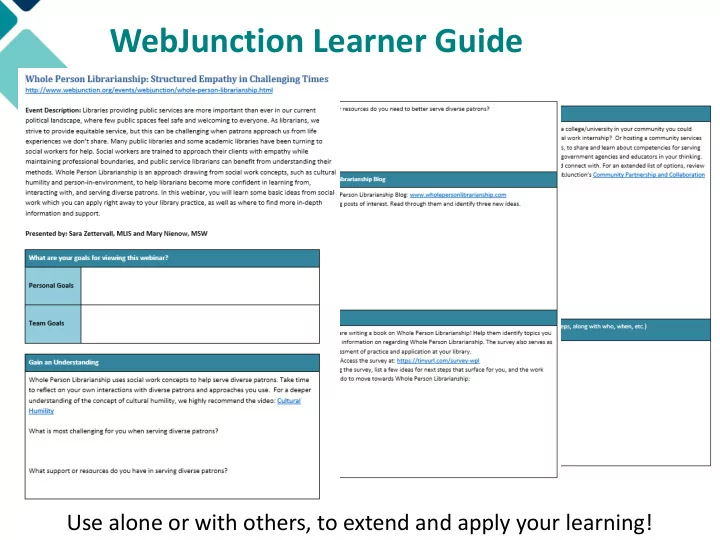

WebJunction Learner Guide Use alone or with others, to extend and apply your learning!
Today’s Presenters Sara Zettervall Librarian, Hennepin County Library, Minneapolis, MN Mary C. Nienow PhD Candidate, University of Minnesota, St. Paul, MN
WHOLE PERSON LIBRARIANSHIP: Fostering Empathy in Challenging Times Sara Zettervall, MLIS, MFA Librarian, Hennepin County Library, Minneapolis, MN Mary C. Nienow, MSW PhD Candidate, University of Minnesota, St. Paul, MN
WHO ARE SARA AND MARY? Mary C. Nienow (left) • Completing PhD in Social Work at the University of Minnesota • Assistant Professor at UW-Eau Claire in fall 2017 Sara Zettervall (right) • Founder, Whole Person Librarianship • Community Engagement Librarian, Hennepin County Library, Minneapolis
WHAT IS WPL? www.wholepersonlibrarianship.com Whole Person Librarianship: 1. Library-social work collaboration in library settings 2. Concepts of social work applied to library practice
WEBINAR STRUCTURE • Social work core values • Person-in-environment • Library-in-environment • Cultural humility approach • Resources • Questions
What do you hope to get from this webinar?
CORE VALUES SOCIAL WORK LIBRARIANSHIP • Service • Access • Intellectual Freedom • Social Justice • Confidentiality/ • Preservation Privacy • Dignity and worth of the person • Democracy • The Public Good • Importance of human • Diversity • Professionalism relationships • Integrity • Education and • Service Lifelong Learning • Competence • Social Responsibility http://www.naswdc.org/pubs/code/code.asp http://www.ala.org/advocacy/intfreedom/statementspols/corevalues
STAYING GROUNDED IN LIBRARIANSHIP
PERSON IN ENVIRONMENT Person-in-environment means understanding an individual and their behavior based on the environmental contexts in which they live. This perspective directly informs practice . Paraphrased from http://socialwork.oxfordre.com/
HOW DOES THIS INFORM PRACTICE? Examples from Social Work: • Assessment • Relationship Building • Paying attention to power and privilege
When has understanding the context of a person’s life helped you give great library service?
HOW DOES THIS INFORM PRACTICE? Examples from Librarianship: • ALA advocates for funding for public internet access • Many libraries provide lunch for kids during the summer • Obama asked libraries to support ACA enrollment • Services for patrons experiencing homelessness meet them where they are
LIBRARY-IN-ENVIRONMENT Contact in the library Hand-off to social Community Integration service provider Service Case mgmt Orgs, and Housing, referrals etc.
CULTURAL HUMILITY A step beyond cultural competence. “Those who practice cultural humility work to increase their self-awareness of their own biases and perceptions and engage in a life- long self-reflection process about how to put these aside and learn from clients.” http://socialwork.sdsu.edu/insitu/diversity/cultural-humility-a-lifelong-practice/
CULTURAL HUMILITY Cultural Competence Cultural Humility • Cultural knowledge • Self awareness • Cultural skill • Lifelong learning • Cultural encounters • Institutional Accountability • Cultural desire • Supportive Interactions Campinha-Bacote (2002) Tervalon and Garcia (1998); Foronda (2015)
HOW DOES THIS INFORM PRACTICE? • Client as the expert in their own life • Supervision to check our own biases • Moving away from the “checklist” in social work education and focusing on historic and current issues of oppression, privilege and discrimination
HOW DOES THIS INFORM PRACTICE? Cultural humility is an approach , not a result. • Be in the community without an agenda • Ask people about their lives and interests • Talk to them about what they’re doing with their day • Ask yourself: How do I use my library-specific expertise to be of help?
HOW DOES THIS INFORM PRACTICE? Examples from Librarianship: • Teen Advisory Groups • Spaces and supplies to make the library safe for kids on the autism spectrum • Prayer space for Muslims
When has learning something new about a patron’s culture shifted your perspective or approach?
LEARN MORE • www.wholepersonlibrarianship.com • Join our Community of Practice! • Google map from earlier • Research article shared library (Zotero) • Prior writings on exploring this topic • edX Michigan Social Work “ MicroMasters ” • Session at ALA Annual in June
LEARN MORE • Connect with your local social service agencies • Talk to your closest university – do they have social work students who could intern at the library?
OUR RESEARCH AND BOOK “Whole Person Librarianship,” Libraries Unlimited, 2019 • Survey • Link: https://tinyurl.com/survey-wpl • What do people know? What stories can we share? • Good for self-assessment as well as sharing info
What questions do you have? How will you use what you just learned?
THANK YOU! Sara Zettervall – sara@wholepersonlibrarianship.com Mary Nienow – nienowmc@uwec.edu
Recommend
More recommend